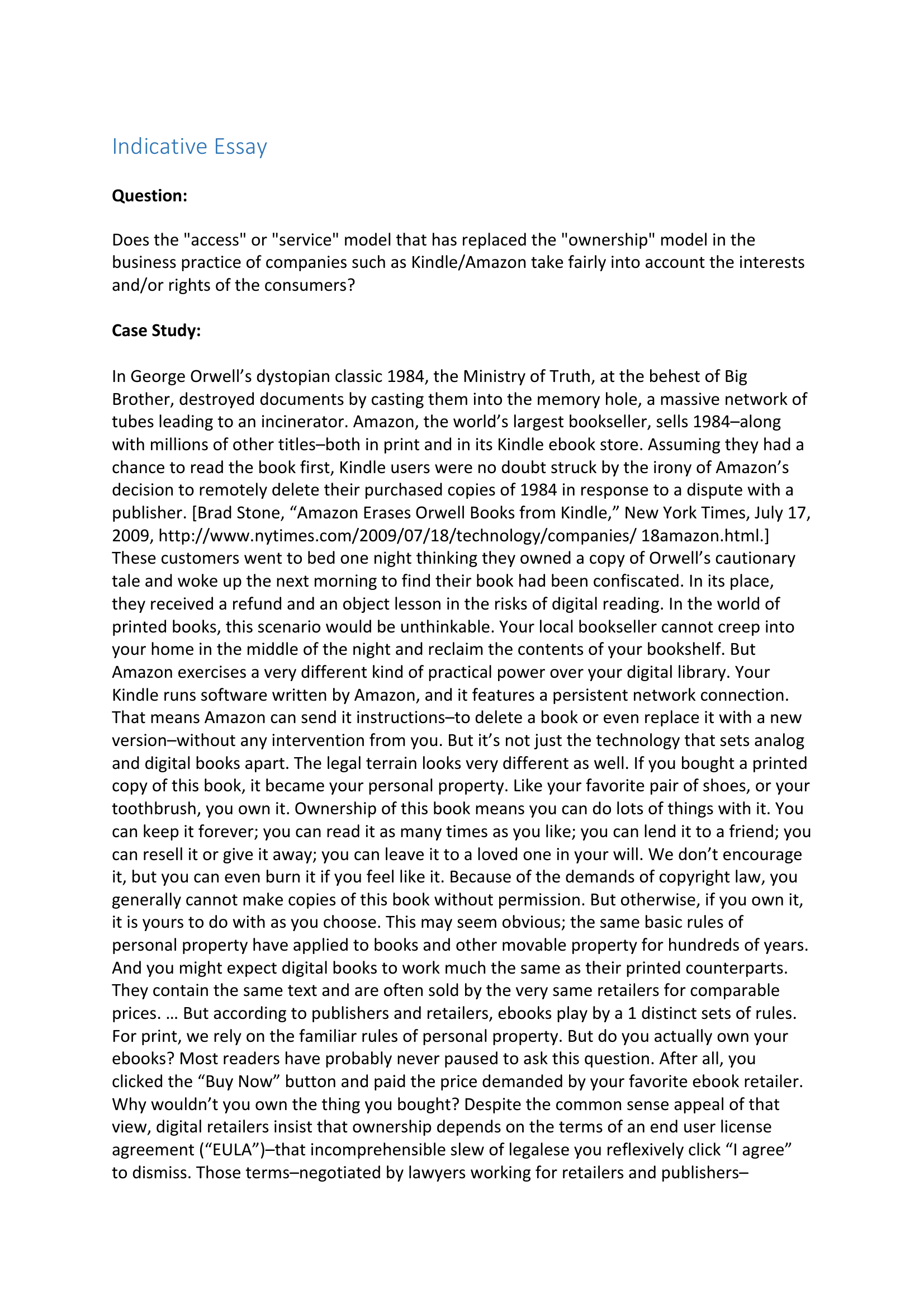Does the "access" or "service" model that has replaced the "ownership" model in the business practice of companies such as Kindle/Amazon take fairly into account the interests and/or rights of the consumers?
Publié le 13/03/2022
Extrait du document
«
Indicative Essay
Question:
Does the "access" or "service" model that has replaced the "ownership" model in the
business practice of companies such as Kindle/Amazon take fairly into account the interests
and/or rights of the consumers?
Case Study:
In George Orwell’s dystopian classic 1984, the Ministry of Truth, at the behest of Big
Brother, destroyed documents by casting them into the memory hole, a massive network of
tubes leading to an incinerator.
Amazon, the world’s largest bookseller, sells 1984–along
with millions of other titles–both in print and in its Kindle ebook store.
Assuming they had a
chance to read the book first, Kindle users were no doubt struck by the irony of Amazon’s
decision to remotely delete their purchased copies of 1984 in response to a dispute with a
publisher.
[Brad Stone, “Amazon Erases Orwell Books from Kindle,” New York Times, July 17,
2009, http://www.nytimes.com/2009/07/18/technology/companies/ 18amazon.html.]
These customers went to bed one night thinking they owned a copy of Orwell’s cautionary
tale and woke up the next morning to find their book had been confiscated.
In its place,
they received a refund and an object lesson in the risks of digital reading.
In the world of
printed books, this scenario would be unthinkable.
Your local bookseller cannot creep into
your home in the middle of the night and reclaim the contents of your bookshelf.
But
Amazon exercises a very different kind of practical power over your digital library.
Your
Kindle runs software written by Amazon, and it features a persistent network connection.
That means Amazon can send it instructions–to delete a book or even replace it with a new
version–without any intervention from you.
But it’s not just the technology that sets analog
and digital books apart.
The legal terrain looks very different as well.
If you bought a printed
copy of this book, it became your personal property.
Like your favorite pair of shoes, or your
toothbrush, you own it.
Ownership of this book means you can do lots of things with it.
You
can keep it forever; you can read it as many times as you like; you can lend it to a friend; you
can resell it or give it away; you can leave it to a loved one in your will.
We don’t encourage
it, but you can even burn it if you feel like it.
Because of the demands of copyright law, you
generally cannot make copies of this book without permission.
But otherwise, if you own it,
it is yours to do with as you choose.
This may seem obvious; the same basic rules of
personal property have applied to books and other movable property for hundreds of years.
And you might expect digital books to work much the same as their printed counterparts.
They contain the same text and are often sold by the very same retailers for comparable
prices.
… But according to publishers and retailers, ebooks play by a 1 distinct sets of rules.
For print, we rely on the familiar rules of personal property.
But do you actually own your
ebooks? Most readers have probably never paused to ask this question.
After all, you
clicked the “Buy Now” button and paid the price demanded by your favorite ebook retailer.
Why wouldn’t you own the thing you bought? Despite the common sense appeal of that
view, digital retailers insist that ownership depends on the terms of an end user license
agreement (“EULA”)–that incomprehensible slew of legalese you reflexively click “I agree”
to dismiss.
Those terms–negotiated by lawyers working for retailers and publishers–.
»
↓↓↓ APERÇU DU DOCUMENT ↓↓↓
Liens utiles
- Egeria (Aegeria) Roman A goddess of springs, perhaps originally a goddess of the Babine people; also considered a deity that protected pregnant women and helped them bring their babies safely into the world.
- Statistics I INTRODUCTION Statistics, branch of mathematics that deals with the collection, organization, and analysis of numerical data and with such problems as experiment design and decision making.
- Statistics I INTRODUCTION Statistics, branch of mathematics that deals with the collection, organization, and analysis of numerical data and with such problems as experiment design and decision making.
- Why might the separation of ownership and control result in lower firm profits? Do you think that the market for corporate control is effective disciplining managerial behavior?
- Lincoln: "The Monstrous Injustice of Slavery" Abraham Lincoln had settled into his Illinois law practice in 1854 when the United States Congress passed the Kansas-Nebraska Act.

































